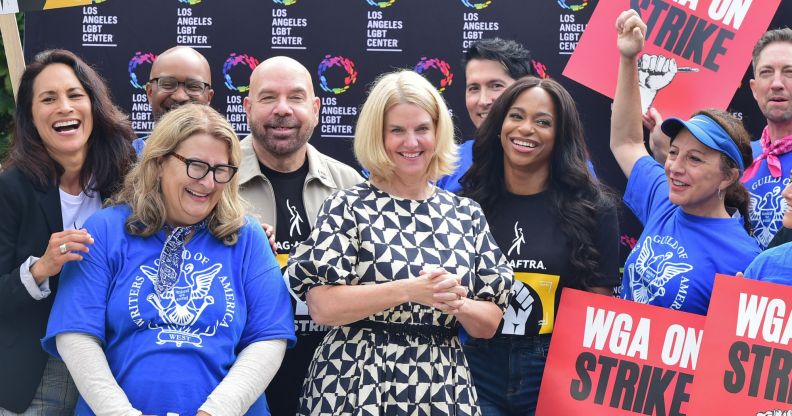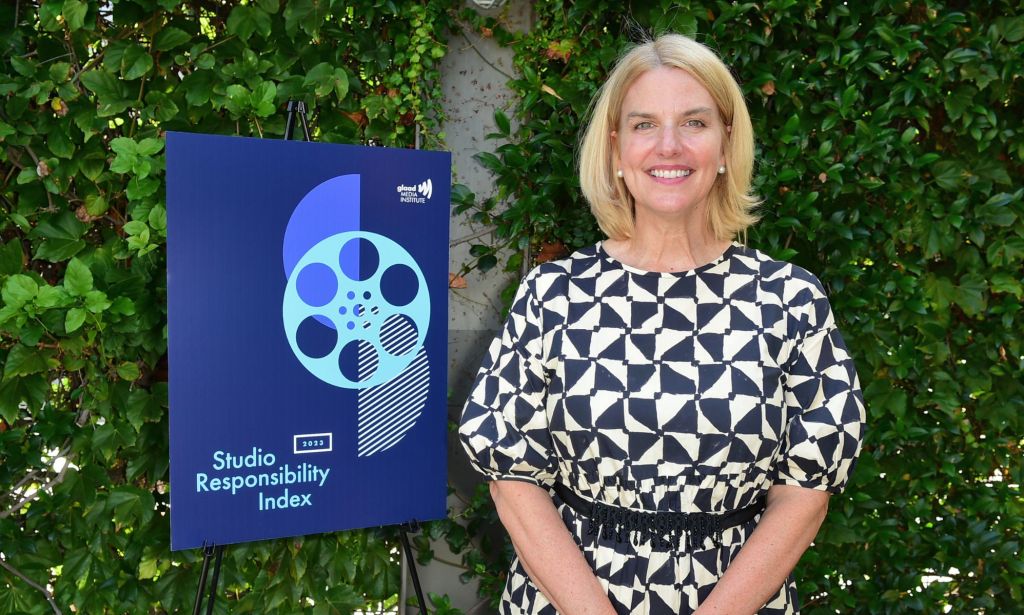Most LGBTQ+ film and TV characters get under five minutes screen time, GLAAD finds

GLAAD will be honoured with the Governors Award at the Emmys in January. (Getty)
Over half of LGBTQ+ characters in modern television and cinema have just under five minutes of screen time, a new GLAAD report has found.
The LGBTQ+ advocacy group released the 2023 edition of its annual Studio Responsibility Index on Thursday (14 September), this time with the help of striking writers’ and actors’ unions.
The Screen Actors Guild and American Federation of Television and Radio Artists (SAG-AFTRA) and the Writer’s Guild of America (WGA) joined GLAAD at a press event to highlight the report, which found that LGBTQ+ representation in film and TV still has a long way to go.
The report examines the quantity and quality of LGBTQ+ representation in media and compares it to the previous year. It also serves as a “road map” for media studios to identify issues in their approach to LGBTQ+ representation.
28 per cent of films from major studios feature an LGBTQ+ character
The GLAAD report found that just over 28 per cent of films from major studios include an LGBTQ+ character, and over half of them are seen on screen for less than five minutes.
GLAAD noted that the percentage was the highest recorded in over a decade, but added that it must be considered with the context that it is tracking a higher number of films in 2023 under “new methodology”.
A total of 292 LGBTQ+ characters were featured across 100 films, and 40 per cent of those tracked were characters of colour – a percentage GLAAD said had “remained static” on the previous year.
Just 12 of those films also included transgender characters – 12 per cent in total. Additionally, only 11 LGBTQ+ characters with a disability had been counted.
As part of the report, GLAAD developed a method for testing LGBTQ+ character portrayal similar to the Bechdel Test, a baseline measure of female representation in media.
Dubbed the Four-Point Vito Russo Test, the method has four separate points of criteria – it must include an LGBTQ+ identifying character, that character must not be solely defined by their gender or sexual orientation, they must be tied to the plot in a meaningful way, and they must not be outwardly offensive.
GLAAD defined non-outwardly offensive LGBTQ+ characters as avoiding “defaulting to well-known tropes or stereotypes with no further development”.
Seventy-seven per cent of LGBTQ-inclusive films considered in GLAAD’s report passed the Four-Point Vito Russo Test.
‘Seeing diverse representation on screen is vital for empowering everyone’
The GLAAD report also noted research from The Trevor Project, which found that 89 per cent of LGBTQ+ young people think that LGBTQ+ inclusion is one of the top factors in gender or sexual orientation affirmation.
SAG-AFTRA president Fran Drescher said that the report and the efforts both GLAAD and the media unions involved are vital at a time when a “very tiny but loud segment of our population” has worked to spread hateful rhetoric targeting the LGBTQ+ community.
“Seeing diverse representation on screen is vital for empowering everyone to embrace their authentic selves,” Drescher said.
The report comes amid indefinite strikes across the world of film and TV, with actors joining writers on the picket line in the hope of achieving a fairer division of streaming profits and better working conditions in a high-profile and ever-changing industry.
“Sadly, the longer the AMPTP companies keep the entertainment industry shut down by refusing to come back to the bargaining table, the more risk there is for disrupting the progress that’s been made in terms of inclusive representation,” Drescher continued.
“Let’s make a deal and end this stalemate so we can continue sharing diverse stories and create a more hopeful, empathetic society for today’s young people.”

GLAAD president and CEO, Sarah Kate Ellis echoed Drescher’s views, adding that due to the “unprecedented cultural and political attacks” the community faces, “it is more important than ever to hold film studios accountable for how our community is represented on-screen”.
“The LGBTQ+ characters and stories found in this year’s study would not exist without the work of talented writers, actors, directors, and crew on all levels,” Ellis continued.
“GLAAD firmly stands in solidarity with the SAG-AFTRA and the Writer’s Guild of America WGA in their efforts and contributions to fair and accurate storytelling integral to the LGBTQ+ movement.”

